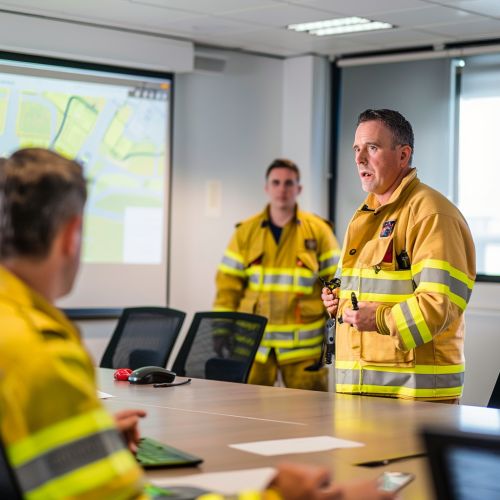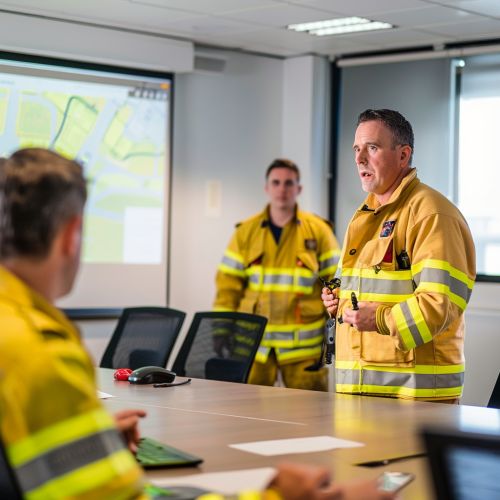Institution of Fire Engineers
History and Formation
The Institution of Fire Engineers (IFE) was established in 1918 by a group of British fire professionals who recognized the need for a professional body to represent the interests of fire engineers. The founding members aimed to create an organization that would promote the advancement of fire engineering knowledge and practice, and provide a platform for the exchange of ideas and information among fire professionals.
The IFE was granted a Royal Charter in 1924, which formally recognized its status as a professional institution. The Royal Charter outlined the IFE's objectives, which included promoting the science and practice of fire engineering, encouraging the education and training of fire engineers, and fostering collaboration and communication among fire professionals.
Objectives and Mission
The primary mission of the Institution of Fire Engineers is to promote, encourage, and improve the science and practice of fire engineering, fire prevention, and fire extinction. The IFE aims to achieve this mission through a variety of activities, including:
- Providing a platform for the exchange of knowledge and information among fire professionals.
- Promoting the education and training of fire engineers through accredited courses and professional development programs.
- Conducting research and publishing technical papers on fire engineering topics.
- Organizing conferences, seminars, and workshops to facilitate the dissemination of knowledge and best practices.
- Collaborating with other professional bodies, government agencies, and industry stakeholders to advance the field of fire engineering.
Membership and Professional Development
The IFE offers several categories of membership, each tailored to different levels of experience and expertise in the field of fire engineering. These categories include:
- **Student Membership**: For individuals who are currently studying fire engineering or a related discipline.
- **Graduate Membership**: For individuals who have recently completed a fire engineering degree or equivalent qualification.
- **Associate Membership**: For individuals who have gained practical experience in fire engineering and have demonstrated a commitment to the profession.
- **Member (MIFireE)**: For experienced fire engineers who have made significant contributions to the field and have demonstrated a high level of competence and professionalism.
- **Fellow (FIFireE)**: For senior fire engineers who have made outstanding contributions to the profession and have achieved a high level of distinction in their careers.
The IFE also offers a range of professional development opportunities, including accredited courses, workshops, and seminars. These programs are designed to help fire engineers stay up-to-date with the latest developments in the field and enhance their skills and knowledge.
Certification and Accreditation
The IFE is responsible for accrediting fire engineering courses and programs offered by educational institutions around the world. The accreditation process involves a rigorous assessment of the course content, teaching methods, and assessment procedures to ensure that they meet the high standards set by the IFE.
In addition to accrediting educational programs, the IFE also offers a range of professional certifications for fire engineers. These certifications are designed to recognize the expertise and competence of fire engineers in specific areas of practice. Some of the key certifications offered by the IFE include:
- **IFE Level 2 Certificate in Fire Science, Operations, and Safety**: This certification is aimed at individuals who are new to the field of fire engineering and provides a foundational understanding of fire science and safety principles.
- **IFE Level 3 Diploma in Fire Science and Fire Safety**: This certification is designed for fire engineers who have gained some practical experience and wish to deepen their knowledge of fire science and safety.
- **IFE Level 4 Certificate in Fire Engineering Science**: This certification is aimed at experienced fire engineers who wish to demonstrate their expertise in fire engineering science and practice.
Research and Publications
The IFE is committed to advancing the science and practice of fire engineering through research and the dissemination of knowledge. The institution conducts and supports research on a wide range of fire engineering topics, including fire dynamics, fire safety engineering, fire prevention, and fire suppression.
The IFE publishes a variety of technical papers, research reports, and industry guidelines to share the findings of its research and promote best practices in the field. Some of the key publications produced by the IFE include:
- **The International Fire Professional Journal**: A quarterly publication that features articles on the latest developments in fire engineering, case studies, and technical papers.
- **Technical Papers and Research Reports**: Detailed reports on specific fire engineering topics, based on original research conducted by the IFE or its members.
- **Industry Guidelines and Best Practice Documents**: Practical guides and recommendations for fire engineers, based on the latest research and industry standards.
Conferences and Events
The IFE organizes a range of conferences, seminars, and workshops to facilitate the exchange of knowledge and best practices among fire professionals. These events provide an opportunity for fire engineers to network with their peers, learn about the latest developments in the field, and share their own experiences and insights.
Some of the key events organized by the IFE include:
- **The Annual IFE Conference**: A flagship event that brings together fire professionals from around the world to discuss the latest trends and challenges in fire engineering.
- **Regional Seminars and Workshops**: Smaller, more focused events that provide in-depth training and knowledge-sharing on specific fire engineering topics.
- **Webinars and Online Training**: Virtual events that allow fire engineers to access training and professional development opportunities from anywhere in the world.
Global Reach and Collaboration
The IFE has a global presence, with branches and members in over 40 countries around the world. The institution works closely with other professional bodies, government agencies, and industry stakeholders to promote the advancement of fire engineering on a global scale.
Some of the key international collaborations and partnerships of the IFE include:
- **The International Fire Safety Standards Coalition (IFSSC)**: A global coalition of professional bodies and organizations that aims to develop and promote international standards for fire safety.
- **The Global Fire Engineering Network (GFEN)**: A network of fire engineering professionals and organizations that facilitates the exchange of knowledge and best practices on a global scale.
- **Partnerships with Educational Institutions**: The IFE collaborates with universities and colleges around the world to develop and deliver accredited fire engineering courses and programs.
Governance and Structure
The IFE is governed by a Board of Directors, which is responsible for setting the strategic direction of the institution and overseeing its operations. The Board is composed of senior fire engineering professionals who are elected by the membership.
The day-to-day operations of the IFE are managed by a Chief Executive Officer (CEO) and a team of staff based at the institution's headquarters. The IFE also has a number of committees and working groups that focus on specific areas of fire engineering practice and policy.
Challenges and Future Directions
The field of fire engineering is constantly evolving, and the IFE faces a number of challenges as it seeks to promote the advancement of the profession. Some of the key challenges and future directions for the IFE include:
- **Adapting to Technological Advances**: The rapid pace of technological change presents both opportunities and challenges for fire engineers. The IFE is committed to helping its members stay up-to-date with the latest developments in fire engineering technology and practice.
- **Promoting Diversity and Inclusion**: The IFE recognizes the importance of promoting diversity and inclusion within the fire engineering profession. The institution is working to attract a more diverse range of individuals to the field and support their professional development.
- **Addressing Global Fire Safety Challenges**: The IFE is committed to addressing global fire safety challenges, such as the increasing frequency and severity of wildfires and the need for improved fire safety in developing countries. The institution is working to develop and promote best practices for fire safety on a global scale.
See Also


